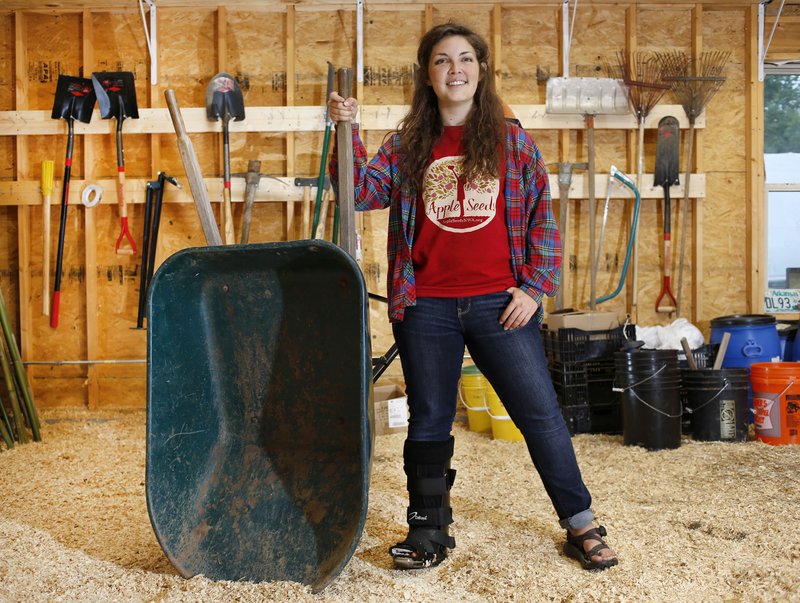Destiny Schlinker was a Foodcorps member teaching garden nutrition education in Springdale schools when Apple Seeds Inc. turned her head.
The nonprofit uses garden education, primarily for children, to inspire healthy living through nutritious choices.
Picnic on the Farm
What: An Apple Seeds summer fundraiser with live music, games, farm tours, drinks and gourmet picnic baskets. Tickets for the meal should be purchased in advance.
When: 4-7 p.m. June 11
Where: Apple Seeds Teaching Farm, 1699 Hillcrest Ave., Fayetteville (adjacent to Ozark Natural Foods)
Information: appleseedsnwa.org or email contact@appleseedsn…
It seemed like "everything I'd done was in preparation for Apple Seeds," she says. Formerly with Heifer International, Schlinker did her thesis on service learning in schools and how to better engage teachers. "I saw they were doing similar things."
Already knee deep in providing nutrition education, Schlinker bumped into Apple Seeds members through school garden markets, where children sell produce to exercise math skills and build excitement around healthy food.
They even provided further nutrition education through teacher training sessions and handed out resource kits to help Schlinker and others like her do their teaching jobs more efficiently.
"I loved them [already]. I was at this conference and mentioned that my dream job would be with Apple Seeds," she says. It seemed like a silly thing to admit because the relatively new nonprofit didn't hire frequently. But their representative said, "'Actually, we're hiring right now.'
"I sent them the creepiest message [imbued with] all my admiration and a few months later joined the team."
Now programs manager for the Fayetteville based nonprofit, any given day you can count on Schlinker being there in schools, helping students and teachers with the garden markets, coordinating hands-on events at the Apple Seeds teaching farm or guiding teachers in workshops on how to make a garden flourish.
The most recent teaching workshop in February led 67 teachers from 23 different schools through stations for practical information about seed saving, starting plants and managing soil, among other things.
Through the FarmLab program, more than 1,300 students visit the teaching farm to investigate food. They're allowed to touch the plants -- to plant the seeds, even! -- harvest the produce, wash it, prepare a snack and eat it.
"At FarmLab we just have so much fun with the kids ... seeing them harvest a carrot for the first time is really magical," Schlinker says. "And the teachers are always pleasantly surprised to see how much it fits into what they're doing in the classroom."
Activities are rooted in science, math and English, and they reflect Common Core standards. These particular ones tend to stick with children longer, having had that real world experience of taste, touch and feel.
Apple Seeds has been receiving students for just under two years and even in such a short time frame, the FarmLab harvest and nutritional station made an impact at home.
"It requires them to pick plants, make a healthy snack and take leadership of the recipe," Schlinker says. She and other volunteers pick things that are easy enough to replicate at home, and it's worked. "About 30 percent of students were going home and making that snack again, and 80 percent had an increased positive attitude toward healthy fruits and vegetables.
"They're more willing to try it if they've harvested it or planted it and have that connection, which is our mission: to get them excited about fruits and vegetables."
Visiting students don't just learn and enjoy. They give back, too, by planting the next round of veggies. All raised beds in the more than 5,000-square-foot garden are full of plants secured by the children themselves. Volunteer teams from large companies like Walmart, Tyson Foods and J.B. Hunt come in behind them to till, prepare soil and maintain the garden.
The Apple Seeds farm has grown and given up more than 3,000 pounds of food to local garden markets at schools in Fayetteville and Springdale since it opened in fall of 2014.
"That all goes back to the students but they use some of their own [produce] to supplement it," Schlinker says. Schools have the chance to create and tend their own gardens -- with helpful lessons and tips from Apple Seeds along the way -- to further supply their markets.
Although the Apple Seeds teaching farm sees plenty of visitors through field trips, school markets are an ideal way for local students to continue learning on their home turf, Schlinker says. Beyond healthy eating habits, children are learning the nuances of homegrown food, like seasonality of vegetables, life skills like teamwork, accountability and taking pride or ownership in something. Not to mention the various more academic lessons, like writing a poem about food or a recipe that combines their new skills.
"The workshop for me is my favorite part because it's a way to reach more students through the teachers," Schlinker says. An Apple Seeds garden coordinator follows up with instructors to answer questions about building their respective school gardens. The project "is something that can be really daunting."
When teachers leave, they have continued access to gardening resources through a web link by Apple Seeds to create produce sustainability within the schools.
This year, while teachers are fostering green thumbs, children can visit the Apple Seeds teaching farm for an inaugural farm-to-table summer camp program. The week of lessons includes harvesting, garden activities and learning to cook healthy meals.
"Our goal is to bring students in to learn how to be garden ambassadors for their own schools so they can go back and lead garden-to-table [practices] there," Schlinker says. Children love to be leaders, and "they have such good ideas."
NAN Profiles on 05/29/2016

